Bringing the Internet home to Kenya
By Nicole Casal Moore
News Service
“Dead aid.” That’s how Rama Mwenesi refers to the kind of foreign help that means well but doesn’t last. He saw it first-hand growing up in and around Nairobi, Kenya.
“Groups would come in and build water wells in the rural communities without thinking about how we’d ensure that they were maintained. They would leave instructions, but people didn’t always understand them. No one had taken into account how the technology would interact with the environment and the people,” recalled Mwenesi, a graduating senior in industrial and operations engineering who has lived in the U.S. since he was 17 years old.
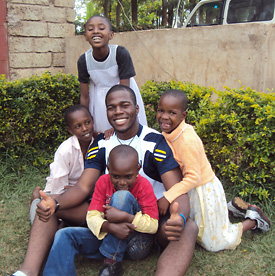
Rama Mwenesi. Photo courtesy Rama Mwenesi.
So, as a freshman at U-M, Mwenesi was pleased to learn of a student project that brought the Internet to off-the-grid parts of his home country. Then he was upset, but not surprised, to learn that the project had to be abandoned because its solar-powered satellite stations were too expensive for communities to keep open.
“It was similar to the stereotypical dead-aid methodology,” he said.
It also was a call to action. Over the course of his time here, Mwenesi aligned his studies with his passion for the project and found success in both. He switched his degree focus from designing products to “optimizing how people work together to achieve a common goal.” He founded the student group E-MAGINE to reinvigorate the project.
“When he came on board, the project was on its last breath,” said Darren McKague, an assistant research scientist in atmospheric, oceanic and space sciences and E-MAGINE adviser. “He saw what direction it needed to go and made it happen.”
Mwenesi minored in multidisciplinary design and led a team of undergraduates that developed an updated Internet station that cost 40 percent less than the original. The new approach is based on amplifying the cellular network rather than on satellites.
He enrolled in the program in entrepreneurship and set up a social venture business model to fund the stations. Paying customers cover the costs of their own unit and another in a place that can’t afford one.
The students have designed and built seven custom systems and installed six in Kenya, Brazil, Sierra Leone and Zambia. After graduation, Mwenesi hopes to work in the field of organizational development and continue working on E-MAGINE.
“Access to the Internet,” he said, “serves as a catalyst to each and every other fundamental human right.”
LSA senior hopes to help promote diplomatic dialogue
By Maryanne George
LSA Communications
Growing up in the Chicago suburb of Deerfield, Ill., Daniel Chardell says he was raised in a secure, affluent environment. But when he began to study history at U-M he realized conflicts around the world, especially in the Middle East, were complex and often misunderstood.
Majoring in history, with a minor in international studies through the LSA Honors Program, he immersed himself in the study of the Cold War, Russia, the Middle East conflict and the roots of the interfaith miscommunication and ethnic conflict.
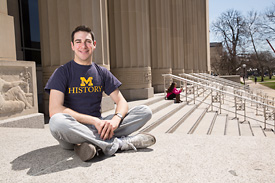
Daniel Chardell. Photo by Austin Thomason, Michigan Photography.
He met international students participating in conversation groups through the Program on Intergroup Relations and volunteered at the Sweetland Center for Writing, tutoring international students in English.
“Growing up in a nice suburb it’s easy to feel safe and secure,” says Chardell, 22. “I had never felt discrimination and it’s easy to settle into your shell. But there are issues that must be tackled and the best way is through face-to-face dialogue.”
After graduation, Chardell will begin that dialogue with an internship at the U.S. Department of State in Washington, D.C., in the Bureau of International Organization Affairs, Office of Human Rights and Humanitarian Affairs. He will research past human rights abuses and monitor United Nations negotiations on conflicts around the world.
“I’m thrilled to contribute to U.S. policy on human rights in the U.N., but I’m also eager to challenge the system in which I will work,” Chardell says. “Because my office manages U.S. human rights policy in the United Nations, my internship will bring me into contact with the issue of Palestinian refugees, their rights and relations with Israel and other Arab governments.”
After gaining policy experience, Chardell will get a boots-on-the-ground perspective. He will spend 10 months in Israel participating in Tikkun Olam, an Israeli service-learning program for young Jews interested in Arab-Israeli coexistence. Participants live, work and study in Jaffa, a diverse part of Tel Aviv that is home to Ashkenazi, Mizrahi and Ethiopian Jews, as well as Muslim and Christian Arabs.
Chardell, who is fluent in Spanish and is studying Russian, will study Hebrew and Arabic in Israel. He’ll use his language skills tutoring at-risk Arab and Jewish students in English.
“Language is such an important part of dialogue,” he says. “To be able to speak someone’s language shows you’re interested in what they think.”
Chardell plans to study law or history in graduate school and hopes to be become a diplomat.
“I won’t be able to solve the world’s problems but I can contribute to the re-humanization of adversaries and start a dialogue,” he says. “All this talk about war is not productive.”
Tackling global health care with simple innovations
By Mandira Banerjee
News Service
Growing up in Houghton, Carolyn Yarina took care of about 100 sheep on her parents’ farm. She credits that for laying a foundation for her life. “It taught me about hard work and about taking care of people,” she said.
Now, at 22, Yarina is ready to do just that. After graduating with a bachelor’s degree in chemical engineering from U-M, she plans to move to Bangalore, India, this fall to launch Centricyle, a startup that will produce simple medical technology for rural India. The company’s first product is a manual centrifuge that operates without electricity.
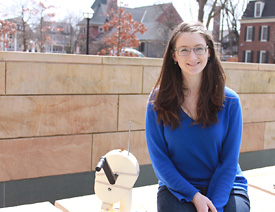
Carolyn Yarina. Photo by Mandira Banerjee, News Service.
Yarina’s journey with Centricyle started when she signed up for a “Design for Real World” class as a freshman and joined the M-Heal team. The team members worked on making a manual centrifuge and tested the prototype at the U-M Health System with their own blood.
After the course ended, Yarina continued developing and testing the prototype. She understood that the idea had to be streamlined if it was to be viable.
“The social venture practicum that we took in my sophomore year made all the difference. We decided to focus on India at the end of the session,” she said.
As a junior, Yarina went to India with Embrace Innovations, a startup that manufactured low-cost infant warmers, and traveled rural India. “I wanted to get an understanding of how organizations operated and designed for the bottom of the pyramid.”
Being immersed in that setting and seeing the impact the group made in the community inspired Yarina. She also received good feedback for her prototype. “People were asking me, ‘Where can we buy this product?’” That’s when she decided, “This is where I want to be and the moment to take Centricycle forward is now.”
Yarina credits the university for all the support and learning she obtained here. “I have a great team backing me over the last couple of years and we have great resources available at University of Michigan,” she said.
The 2013 RPM Ventures Student Entrepreneur of the Year award winner is looking forward to the next step.
“I’m nervous, it’s a little scary. But I am also excited and feel like I am making the right decision. I will do this till I succeed or fail spectacularly,” she said.
Research opportunities and student groups filled Lyons’ experience
By Jared Wadley
News Service
“Like father, like son.”
Daniel Lyons didn’t anticipate the adage would become true for his career prospects, but now he is following in his father’s footsteps in anthropology. Those steps led him from his hometown of Huntington Woods to U-M, with a detour to Chile.
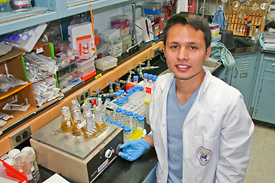
Daniel Lyons. Photo by Jared Wadley, News Service.
Lyons, 21, will graduate next month with degrees in biology and anthropology. His parents did not pressure him to study specific disciplines in college despite success in their own fields. His mother, Mercedes, an Ecuador native, is a medical assistant. His father, Barry, is an anthropology professor at Wayne State University.
“They both certainly do push me to have high expectations for myself, work hard and use all the opportunities I have before me,” Lyons said.
At U-M, where he earned a scholarship, the opportunities both on campus and globally have been overwhelming, he said.
“It was unimaginable how many opportunities there are here at Michigan — so many different kinds of research being done, so many different areas to study in classes or as a major, and so many student groups working on such a wide variety of important issues or doing a lot of great volunteer work,” he said.
In fact, he described his freshman experience as being like a child in a candy store who ate too many treats at one time. Lyons says he joined too many student organizations at one time and couldn’t get deeply involved as much as he wanted. But he decided to reassess his situation, combining his love of biology with cultural anthropology to work toward one day becoming a doctor.
“Seeing the immensity of Michigan, perhaps overwhelming in the beginning, I now feel like I’ve reined it in and … I’ve learned a lot because of it,” he said.
One involvement that hasn’t changed during his four years here has been the Undergraduate Research Opportunity Program, which creates research partnerships among first- and second-year students, U-M faculty, research scientists and staff.
The honors student conducts research on infectious diseases related to HIV at the VA Ann Arbor Healthcare System. He also participated in the Minority Health and Health Disparities International Research Training Program to study how early life stress leads to obesity during adulthood in mice.
UROP also opened global doors for him. During his sophomore year in 2011, he spent the summer in Chile, where he absorbed a new culture, improved his Spanish and created bonds with his host family.
“One of the best things from this experience was living in a Chilean household with a grandmother, Oríana,” he said. “I really forged a great relationship with (them). We still email each other.”
After graduation, Lyons will conduct research on T cells, which direct the human immune system, for one year at the National Institutes of Health in Bethesda, Md. He also plans to apply for medical and post-graduate programs.
Public policy major grows activism community
By Kevin Brown
The University Record
Kevin Mersol-Barg didn’t see himself as a leader. But the 22-year-old Bloomfield Township public policy major couldn’t remain silent upon learning that undocumented students raised in Michigan pay higher out-of-state tuition to attend U-M.
The founder of the Coalition for Tuition Equality (CTE) and fellow members have worked to change university policy. Their activities have included organizing 150 students to protest in solidarity with undocumented students at several Board of Regents meetings.
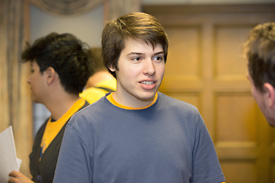
Kevin Mersol-Barg. Photo by Scott Soderberg, Michigan Photography.
Mersol-Barg says the group’s actions played a role in administrators inviting CTE to join a working group on tuition equality. CTE continues to speak out at regents meetings.
And on April 17, Mersol-Barg was arrested after joining protesters organized by One Michigan, an immigrants’ rights organization led by undocumented persons, to block South State Street outside the Michigan Union.
“I sat in solidarity with them because, as an ally, I felt that this is among the most important ways to support undocumented-led action,” says Mersol-Barg. “They risk a tremendous amount to speak out against the university’s discriminatory policies, and the least I can do is face the risks that come with civil disobedience.”
He was introduced to the issue in February 2011 at a Human Rights Through Education conference he helped organize.
“Undocumented students from across the country have been speaking up about this issue for years,” Mersol-Barg says. “I personally know a number of undocumented youth and young adults who would directly benefit from tuition equality.”
To approach his leadership role in the organization, he combined an understanding of politics, student organizations, and human rights with a willingness to try something new. Because CTE has built strong connections with 32 partner student organizations, Mersol-Barg says it can leverage these relationships to educate and mobilize students.
In pursuing CTE’s goals, Mersol-Barg has met privately with several regents. “At first it seemed daunting to meet with many important decision-makers,” he says, adding he had to make the most of opportunities to bring about change.
The reaction to his activism has been positive back home. “My parents are very supportive, and even teachers from my high school are cheering me on,” he says.
Mersol-Barg says his work on the tuition-equality issue has provided a crash course in higher education policy, immigration policy, and how they intersect.
“Because my organization works on an issue of social justice, it’s particularly important that we live out our values and ensure that our decision-making process is equitable, our membership is diverse, and that we understand our relative privilege when working on an issue affecting undocumented students,” he says.
After graduation, Mersol-Barg plans to travel abroad and volunteer, such as through the Peace Corps. “I’m also interested in engaging in policy work, such as a think tank or on Capitol Hill in Washington, D.C.,” he says.
Student finds passion through diverse experiences
By Dana Budzaj Elger
Public Affairs
Even with a family connection dating back 100 years, Micaela McCabe doubted U-M was the right place for her to study art. A resident of Hamburg Township near Brighton, U-M didn’t feel different or far enough from home.
Now, preparing to graduate with a dual degree from LSA and the Penny W. Stamps School of Art & Design, the 22-year-old credits her college experiences for helping her discover a passion for international development.
“My design philosophy is that a product needs to be developed around the community and for the community,” McCabe says.
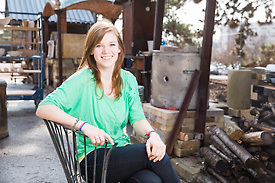
Micaela McCabe. Photo by Eric Bronson, Michigan Photography.
She describes her dream job as working for an international nonprofit agency, creating products for developing countries that are designed considering the area’s tools, resources and lifestyles. It is a position for which her studies — in international development and social change paired with her art skills in industrial product design — have prepared her.
McCabe has visited more than a dozen countries — including Turkey, Egypt, Chile and Bolivia — through study-abroad opportunities, enabling her to build a strong sense of global awareness and the issues facing developing countries.
She recalls her first experience abroad in northern India in the village of Sotla as “mind blowing.”
“I ended up in this rural village six hours away from the nearest city and nobody spoke English or even Hindi. We didn’t have electricity for most of the day. Everything was so drastically different,” she says.
It was during her three-month stay there that she became exposed to the concept of social change through her work teaching young Indian girls English, computer skills and offering HIV education.
McCabe’s senior project this summer will be her sixth time studying abroad as she continues her focus on international development. She will travel to two countries to work with local residents to build devices to improve public health, including bio-sand water filters in Brazil and safer, more efficient home cooking stoves in Tanzania.
The globetrotter says she’s also enjoyed the cultural diversity on campus.
“I realized that diversity is here, and there are so many cool people from different walks of life on campus. You just have to go out there and find it.”
Like her great-grandmother, a member of the U-M class of 1913, and her grandmother who graduated with a degree in art and design in 1941, McCabe will continue the century-old family history with the university when she becomes a proud U-M alum.
“There’s no way growing up in middle-class rural Michigan that I could ever understand the different lifestyles that exists. I’m so happy I ended up coming here.”

